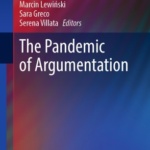 Thanks to the golden Open Access fees covered by the COST Action (CA17132: European network for Argumentation and Public PoLicY analysis (APPLY)) all chapters are available online, for free, under this link. The book itself can also be downloaded in a pdf format.
Thanks to the golden Open Access fees covered by the COST Action (CA17132: European network for Argumentation and Public PoLicY analysis (APPLY)) all chapters are available online, for free, under this link. The book itself can also be downloaded in a pdf format.
This open access book addresses communicative aspects of the current COVID-19 pandemic as well as the epidemic of misinformation from the perspective of argumentation theory. Argumentation theory is uniquely placed to understand and account for the challenges of public reason as expressed through argumentative discourse. The book thus focuses on the extent to which the forms, norms and functions of public argumentation have changed in the face of the COVID-19 pandemic. This question is investigated along the three main research lines of the COST Action project CA 17132: European network for Argumentation and Public PoLicY analysis (APPLY): descriptive, normative, and prescriptive.
The volume offers a broad range of contributions which treat argumentative phenomena that are directly related to the changes in public discourse in the wake of the outburst of COVID-19. The volume additionally places particular emphasis on expert argumentation, given (i) the importance expert discourse has had over the last two years, and (ii) the challenges that expert argumentation has faced in the public sphere as a result of scientific uncertainty and widespread misinformation. Contributions are divided into three groups, which (i) examine various features and aspects of public and institutional discourse about the COVID-19 pandemic, (ii) scrutinize the way health policies have been discussed, debated, attacked and defended in the public sphere, and (iii) consider a range of proposals meant to improve the quality of public discourse, and public deliberation in particular, in such a way that concrete proposals for argumentative literacy will be brought to light. Overall, this volume constitutes a timely inquiry into all things argumentative in pandemic discourse. This volume is of interest to a broad readership including philosophers, linguists, communication and legal scholars, and members of the wider public who seek to better understand the discourse surrounding communicative phenomena in times of crisis.
Table of contents:
Introduction: The Pandemic of Argumentation
Steve Oswald, Marcin Lewiński, Sara Greco, Serena Villata
Pages 1-13
Arguing About the Pandemic
Arguing About the Pandemic
Front Matter
Pages 15-15
Arguing About “COVID”: Metalinguistic Arguments on What Counts as a “COVID-19 Death”
Marcin Lewiński, Pedro Abreu
Pages 17-41
Good and Ought in Argumentation: COVID-19 as a Case Study
Andrés Soria-Ruiz, Mora Maldonado, Isidora Stojanovic
Pages 43-64
How to Handle Reasonable Scientific Disagreement: The Case of COVID-19
Konstantina Antiochou, Stathis Psillos
Pages 65-83
Expert Uncertainty: Arguments Bolstering the Ethos of Expertise in Situations of Uncertainty
Jens E. Kjeldsen, Ragnhild Mølster, Øyvind Ihlen
Pages 85-103
On Arguments from Ignorance in Policy-Making
Corina Andone, José Alfonso Lomelí Hernández
Pages 105-123
The Argumentative Potential of Doubt: From Legitimate Concerns to Conspiracy Theories About COVID-19 Vaccines
Dima Mohammed, Maria Grazia Rossi
Pages 125-144
Pandemic Communication Without Argumentative Strategy in the Digital Age: A Cautionary Tale and a Call to Arms
Fabio Paglieri
Pages 145-161
Justifying and Promoting Health Policies
Rhetoric and Argumentation in the Pandemic Legislation: The Italian Case
Federico Puppo, Silvia Corradi, Lorenzo Zoppellari
Pages 165-186
The Case of Coronavirus Contact-Tracing Apps: Arguments for Trust
Serena Tomasi
Pages 187-202
Securitization, Emergency and the Rediscovery of Responsibility in Times of Pandemic: Analyzing Political Discourses from the European South
Salomi Boukala, Dimitris Serafis
Pages 203-223
The UK Government’s “Balancing Act” in the Pandemic: Rational Decision-Making from an Argumentative Perspective
Isabela Fairclough
Pages 225-246
Justification of Decision-Making in Response to COVID-19 Socio-Scientific Dilemmas
Keren Dalyot, Yael Rozenblum, Ayelet Baram-Tsabari
Pages 247-268
Improving and Promoting Argumentative Literacy
Inoculating Students Again Conspiracy Theories: The Case of Covid-19
Sharon Bailin, Mark Battersby
Pages 271-289
Combatting Conspiratorial Thinking with Controlled Argumentation Dialogue Environments
Lindsay Fields, John Licato
Pages 291-309
Staying Up to Date with Fact and Reason Checking: An Argumentative Analysis of Outdated News
Elena Musi, Andrea Rocci
Pages 311-330

